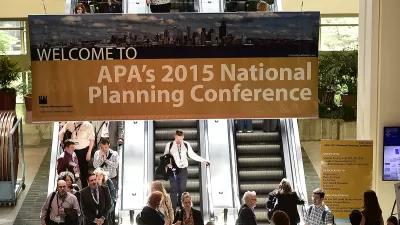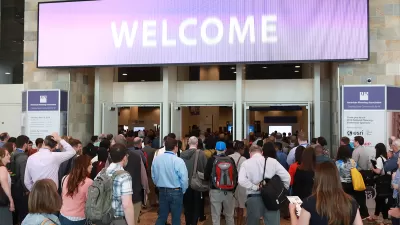The American Planning Association has invited students to contribute blog posts on their reactions to the APA National Conference. Their thoughts so far have revealed holistic concerns and creative thinking—positive signs for the next generation.
A live blog covering the proceedings of the 2015 National Planning Conference in Seattle includes posts from some of the many students in attendance at the event.
First up was Julie Barnard, co-editor of the Carolina Planning Journal and a current economic development student in the Department of City and Regional Planning at the University of North Carolina at Chapel Hill. Barnard's trip to Seattle provided a bird's eye view over the Rockies, Las Vegas, and the Grand Canyon, providing time to reflect on the large environmental challenges facing planners in the 21st century. As a student of the economic development side of planning, Barnard sees opportunities to collaborate across disciplines in a holistic approach to planning.
My experience here in Seattle reminds me that one can simultaneously advance a community’s economic standing and its long-term sustainability, its hazard mitigation strategy and its equity, its downtown district and its walkability.
Barnard also cites examples from the first day of the conference that "show how coalitions of those interested in justice, economic development, and sustainability can be more effective at achieving each goal than any one group alone." The article expands on that idea:
"Jane Jacobs’s idea of 'web thinking' and her assertion that academic institutions have 'deluded us into thinking that there are separate fields of knowledge,' likewise urge us to think beyond professional or narrowly disciplinary boundaries and imagine new ways of achieving positive change."
Another post by Steven Kanner, a master of urban planning student in development and design at Cleveland State University, also notes a similar theme, finding "a thousand viewpoints and perspectives on what planning is and what it should be," so far at the event. Phrases like, "It’s about zoning code flexibility," "Keep it fun," and Kanner's own mantra, "Got to have social fabric."
Kanner concludes insights into the conference's events so far with words of inspiration:
May the day come, when the world is filled with the Jewish concept of Tikkun Olum — a just and repaired world — and there is no need for equity planning. Until then, there is the APA conference and continued hearty and heated discussion and debate on the best path to get us toward these noble goals."
The strong presence of students local and from farther afield is one of the best parts of the National Conference. We're looking forward to more of these posts and hoping that the enthusiasm of these students and others like them is infectious among the ranks of the planners in attendance this year and for years to come.
FULL STORY: Planning, With Partners

Study: Maui’s Plan to Convert Vacation Rentals to Long-Term Housing Could Cause Nearly $1 Billion Economic Loss
The plan would reduce visitor accommodation by 25,% resulting in 1,900 jobs lost.

North Texas Transit Leaders Tout Benefits of TOD for Growing Region
At a summit focused on transit-oriented development, policymakers discussed how North Texas’ expanded light rail system can serve as a tool for economic growth.

Using Old Oil and Gas Wells for Green Energy Storage
Penn State researchers have found that repurposing abandoned oil and gas wells for geothermal-assisted compressed-air energy storage can boost efficiency, reduce environmental risks, and support clean energy and job transitions.

Private Donations Propel Early Restoration of Palisades Playground
Los Angeles has secured over $1.3 million in private funding to restore the Pacific Palisades playground months ahead of schedule, creating a modern, accessible space that supports community healing after recent wildfires.

From Blight to Benefit: Early Results From California’s Equitable Cleanup Program
The Equitable Community Revitalization Grant (ECRG) program is reshaping brownfield redevelopment by prioritizing projects in low-income and environmental justice communities, emphasizing equity, transparency, and community benefits.

Planting Relief: Tackling Las Vegas Heat One Tree at a Time
Nevada Plants, a Las Vegas-based nonprofit, is combating the city’s extreme urban heat by giving away trees to residents in underserved neighborhoods, promoting shade, sustainability, and community health.
Urban Design for Planners 1: Software Tools
This six-course series explores essential urban design concepts using open source software and equips planners with the tools they need to participate fully in the urban design process.
Planning for Universal Design
Learn the tools for implementing Universal Design in planning regulations.
Ascent Environmental
Borough of Carlisle
Institute for Housing and Urban Development Studies (IHS)
City of Grandview
Harvard GSD Executive Education
Toledo-Lucas County Plan Commissions
Salt Lake City
NYU Wagner Graduate School of Public Service




























